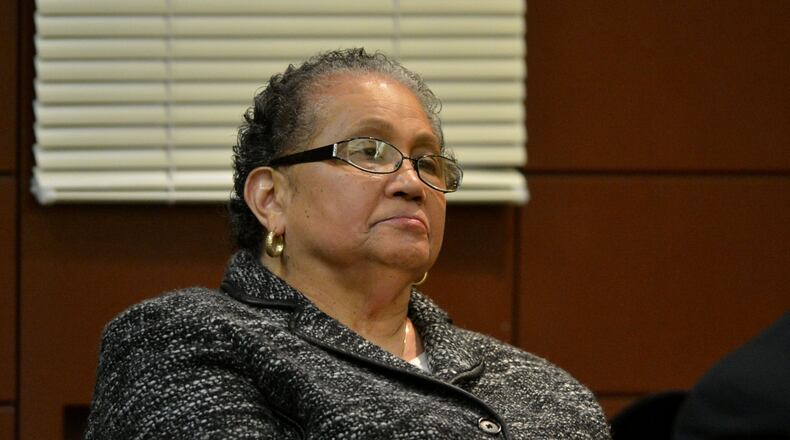Beverly Hall, suffering from Stage IV breast cancer, may be too ill to stand trial next month in the Atlanta Public Schools test-cheating case, her attorney said Tuesday.
The former school superintendent and lead defendant in the racketeering case had to be hospitalized over the weekend, lawyer Richard Deane said after a court hearing. Hall was released but is now being treated by her oncologist, he said.
“It’s obviously a concern,” Deane said, when asked if he was worried whether his client could endure the monthslong trial. “She is seriously ill.”
Deane said he will consult Hall’s doctors on what course of action to take next. He has not made a formal request to postpone the trial because of the illness.
During Tuesday’s status hearing, Superior Court Judge Jerry Baxter announced that jury selection for the case involving Hall and her 12 co-defendants will begin April 28. It could take weeks, even months, to pick a fair and impartial jury, he said.
“We’re setting off on a voyage that could take a long time,” Baxter said.
Hall, 67, faces a racketeering charge that alleges she conspired with others to cheat on standardized tests in order to receive bonus pay and so that schools could meet academic targets. Hall is also charged with theft by taking, giving a false statement and submitting a false document in 2009 when she turned in her superintendent’s test certification to the state Board of Education.
Hall is innocent of all charges and wants to clear her name at trial, Deane has said on numerous occasions.
Deane has not said when Hall was initially diagnosed with Stage IV breast cancer. In September, her legal team confirmed she was battling the disease.
Stage IV breast cancer is considered treatable but not curable, said Amelia Zelnak, an oncologist who specializes in treating breast cancer at the Winship Cancer Institute of Emory University. To keep the illness under control, the treatment is typically indefinite, she said.
How people manage with the Stage IV cancer varies widely, Zelnak said. Some continue working or do what they were doing prior to coming down with the disease, while others find it extremely difficult to do much more than cope with the illness, she said.
There is a 22 percent chance that someone diagnosed with Stage IV breast cancer will survive another five years, according to the American Cancer Society.
Judges have a variety of options on how to deal with such a situation, Atlanta criminal defense attorney Ed Garland said.
“On some occasions, the court will put the trial off indefinitely if it’s going to jeopardize the life of the accused,” Garland said. “I’ve also seen people on stretchers going to trial.”
Sometimes, Garland said, a judge will appoint a medical expert to conduct an independent examination to determine whether a defendant’s physical condition will be compromised by a trial.
“It all depends on the assessment by the judge what course of action won’t jeopardize the life of the defendant,” he said. “The judge could shorten the hours of the trial each day, for example. He has broad discretion.”
There also is the possibility that prosecutors and Hall’s lawyers could reach some sort of agreement that could resolve the case against her. Fulton District Attorney Paul Howard declined to comment on Tuesday’s development, a spokeswoman said.
Another looming issue in the case is a pending appeal filed by Tamara Cotman, a former APS regional director also charged in the racketeering conspiracy. Cotman went to trial last year and was found not guilty of a single count of trying to influence witnesses.
After the acquittal, Cotman’s lawyer, Benjamin Davis, asked Baxter to dismiss the remaining racketeering charge on double jeopardy grounds. When Baxter refused, Davis appealed that decision to the Georgia Court of Appeals.
Special Assistant District Attorney John Floyd said prosecutors would ask the court to dismiss Cotman’s appeal on grounds it is “frivolous and dilatory.”
“I maintain this is a frivolous appeal,” Baxter agreed. “Ms. Cotman, in my opinion, needs to be with us and in my opinion will be a large part of this case. … I’m pleading with (the appeals court) to expedite the matter.”
“It’s not a frivolous appeal,” Davis shot back. He said he could not imagine how the appeals court could fully consider the issue before the April 28 trial date.
This did not please Baxter. But he acknowledged he may have to delay the start of the trial if the appeals court does not promptly dispense with the matter.
Also Tuesday, lead prosecutor Fani Willis warned each defendant and his or her lawyer of the consequences of being found guilty at trial. A racketeering conviction calls for a sentence of up to 20 years in prison, and convictions on other felony counts would only add to that, she said.
Willis said she was willing to give the same deals handed out to the 23 APS defendants who previously pleaded guilty. All received sentences on probation, were given first-offender treatment and were ordered to pay restitution and perform community service.
One by one, defense attorneys said their clients understand the consequences of a possible conviction but are not willing to plead guilty to anything.
“We are looking forward to a trial,” said Gerald Griggs, who represents former Dobbs Elementary School teacher Angela Williamson.
“We are looking forward to giving her one,” Willis said.
About the Author
Keep Reading
The Latest
Featured




